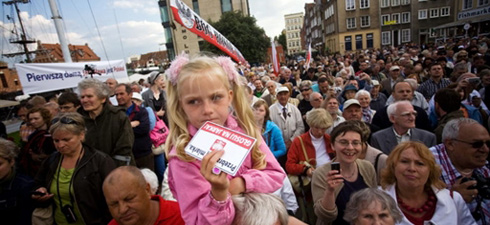There is cause for concern in Europe: the rapid and unexpected upsurge of Poland’s ultra-conservative and Eurosceptical ex-prime minister Jarosław Kaczyński in the polls ahead of the 20 June elections (more out of compassion for the loss of his brother than for his political platform), the rise of nationalism in Hungary and the looming threat of political crisis in Romania and the Baltic States.
In Poland, one of the most securely entrenched democracies in the region, power games are paralysing the government. Analysts say Poland’s economic growth has lagged behind its considerable potential. In 2007 the administration promised to implement reforms to modernise the country (budget cuts, labour market, healthcare and pension reforms), but Lech Kaczyński, the late Polish president, used his veto to block or threaten to block key legislation.
Difficulties not limited to Poland
The customary division of power in the East between the head of state, who serves as guardian of the system, and the head of government, who holds the real executive power, is a source of perennial instability. Suffice it to recall the EU crisis in 2009 when Czech president Václav Klaus refused to sign the Lisbon Treaty after it had passed parliament.
Another prevalent problem in the East is the difficulty of forming governments with sufficiently solid support. In Hungary, the new centre-right executive won an absolute majority in April, but that historic showing at the polls was subsequently clouded by its controversial debut at the helm. In late May, a government spokesman intimated that the public accounts had been doctored and that Hungary, in the throes of its worse economic crisis in 18 years, was in a plight similar to that of Greece. The IMF and EU had to deny these irresponsible remarks to try to calm down the markets.
Instability 30 years after the fall of Communism
Those statements were preceded by the passing of a no less controversial law revealing the nationalist-populist leanings of the new Fidesz party government. The law grants Hungarian citizenship to ethnic Hungarians residing abroad (between two and three million, mainly in Slovakia, Romania, Serbia and Ukraine), a move that opened old wounds in some neighbouring countries, especially Slovakia.
The fact is that the East has been in a state of nearly constant agitation since 1989. 30 years after the fall of Communism, some of the countries in the region that are now in the EU are still having a hard time shoring up stable democracies. Experts point to the volatility of their political formations after the long reign of the Communist regime.
The other scourge is corruption, which is still undermining Romania and Bulgaria. The recession has heated up the debate in those countries over whether they are actually ready for EU accession. In Bucharest, the fragile governing coalition barely managed to hang on by the skin of its teeth in mid-June. Prime minister Emil Boc succeeded in blocking a motion of censure aimed at the draconian austerity measures envisaged by the administration to keep its loan from the IMF and stave off bankruptcy. Efforts to implement austerity plans have already taken a heavy toll on the Lithuanian and Latvian governments, which lost their parliamentary majority in March.
Poland
The great unknown
The final result of the election remains unknown, writes the daily Dziennik Gazeta Prawna, commenting on the first round of the presidential contest in Poland. The number-one spot went to the ruling party’s candidate, Bronisław Komorowski, of the Civic Platform (PO), who got 41.2 percent of the vote. His rival in the run-off, scheduled for 4 July, will be the leader of the Law and Justice (PiS) opposition party, Jarosław Kaczyński, who finished second, with 35.8 percent. Thus, the outcome of the election may be decided by those who voted for Grzegorz Napieralski, the head of the Democratic Left Alliance (SLD), who received 14 percent of the vote. Both PiS and PO will now court his voters, although, as the Polska daily reports, referring to a recent poll, that as many as 66 percent of Napieralski’s electorate have already made up their minds to back Komorowski in the run-off. According to the Gazeta Wyborcza, whether PO’s candidate wins the election will depend on how easily mobilized his supporters turn out to be. The daily warns that “if the false belief that the contest has already been won prevails, then Komorowski may lose.” Meanwhile, conservative Rzeczpospolita bemoans the “stable political views” of most Poles who, despite the Smolensk tragedy and the horrific flood as well as “numerous blunders and lack of charisma”, still voted for Komorowski. Many right-wing commentators are also surprised with the 40-percent support the conservative-centrist PO enjoys after nearly three years in power.
Was this article useful? If so we are delighted!
It is freely available because we believe that the right to free and independent information is essential for democracy. But this right is not guaranteed forever, and independence comes at a cost. We need your support in order to continue publishing independent, multilingual news for all Europeans.
Discover our subscription offers and their exclusive benefits and become a member of our community now!












